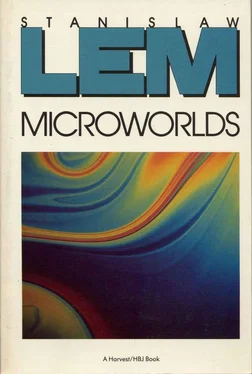ABOUT THE STRUGASTSKY’S ROADSIDE PICNIC
There are subjects that cannot be entirely exhausted. For theologians, such a subject is God. How can one definitively report on something that is, by definition, inexhaustible; how, when the description presumes a limit, can one describe a Being which, in principle, consists of infinite qualities? In this case, various strategies have been used: a multiplication of general concepts — which, however, generates no precise picture; comparisons — but they necessarily reduce the divine attributes to the level of all-too-concrete categories; or a spiraling approach to the subject whereby a definitive determination is replaced by an approximation — which for that reason is likewise inadequate. [17] The foregoing essay, subscribed “July 1975” in the Polish original, has been translated from the text that appeared as the Afterword to Arkady and Boris Strugatsky’s Picknick am Wegesrand (Frankfurt: Suhrkamp, 1981), pp. 189-215. The essay first came out as an afterword to the Polish translation of the Strugatskys” Piknik na obocine: Piknik na skraju drogi (Kraków: Wydawnictwo Literackie, 1977), pp. 265-88. For this last bit of information, and for his generous assistance in checking our rendering of Lem, we are indebted to Dr. Franz Rottensteiner, who, however, is not to be held accountable for our errors. We are equally grateful to Elizabeth Kwasniewski for her help and patience in correcting the English translation against the original Polish. — Robert M. Philmus.
The optimal strategy for theology has proved to be that of maintaining the mysteriousness of God. Yet rigorously to preserve that mystery, one would actually have to remain silent; and a silent theology ceases to be theology. The strategy therefore turned (in later — e.g., Christian — versions) into one operating on obvious contradictions. God the omniscient knew that from man as He had made him would come the Fall. Yet God created him free. If God was aware in advance that man would inevitably fall, then man was not free — which nevertheless is exactly what the theologian asserted he was. In this way dogmatically imposed contradictions create the very mystery before which reason must become silent.
An inexhaustible topic of fantastic literature is the reasonable, yet not human, being. How can a human author describe a being which is definitely gifted with reason, but which, with equally categorical certainty, is not human? The bare assertion of its reasonableness will not do, since the genre must work with facts. Here, too, fantasts have resorted to various strategies. The one that proved the best in theology — namely, preserving the mystery — cannot be applied in exactly the same way: aliens, after all, are not deities but material beings like us. The author who describes them with the aid of various readily apparent contradictions is thus requiring the reader to believe in something absurd; whereas it is not, after all, in the writer’s power to establish no-matterwhat dogmas.
According to the simplest available strategy, then, intelligent beings differ from each other corporeally, and only from this area do their peculiarities arise. Mentally they are identical or similar to human beings, since there can be only one form of Reason. H.
G. Wells gave reality to this view almost a hundred years ago in The War of the Worlds. His Martians have a horrifying appearance, which, however, will some day be man’s.
Their bodies have deteriorated to such an extent that their heads are almost all that remains; and, according to Wells’s surmise, in the man of the future as well, the organism’s viscera will atrophy and the cranium expand. The novel says nothing about Martian culture, as if that, too, had wasted away and consisted of nothing but technical mastery and the equation of might with the cosmic justification of the state. In Wells the future thus simplifies both physiology and culture. His Martians have no interest in anything human except human blood: like vampires, they nourish themselves on it. The Martians’ technological achievements do, to be sure, arouse our admiration, but the poverty of their culture represents the fiction’s greatest weakness. Let us not speak of the loathing the aliens inspire — that can always be referred back to their physical environment. Still, is the behavior of the Martians not an unintentional caricature of an extreme rationalism?
The invasion of Wells’s Martians is certainly justified by their situation as inhabitants of a dying planet that is turning into a desert, from which perspective the fruitful earth hovers as territory (Lebensraum) to be conquered. What proves to be an exceptional case within the solar system was nonetheless thoughtlessly appropriated as the model for the whole science-fiction genre. Indeed, the successors to Wells mechanically imitated the failings of the master. The science fiction that followed his sickened on the chronic monstrosity of stellar invaders, while leaving behind the rationale by which Wells accounts for it. Furthermore, later writers, wanting at all costs to surpass the founder of the genre in their rendering of aliens’ hideousness, went well beyond the limits of plausibility. By equipping their aliens with ever greater power, they filled the entire universe with civilizations whose desire to expand is wholly irrational. The greater the power attributed to the aliens, the more irrational is their invasion of earth. In this phase, science fiction became a fantasy of imposture and of paranoid delusions, because it claimed that the cosmic powers were sharpening their fangs the better to eat humanity, as if earth and its treasures were of incalculable value not only for the inhabitants of a small desert planet like Mars, but also for every imaginable civilization in the galaxy. Yet the preconception that a power with armies of starships at its disposal could be dead set on taking over our property is as naïve as the assumption that one of the superpowers of earth would mobilize its armies in order to expropriate a grocery store. The price of the invasion must always be higher than the value of the loot.
Thus invasion plots could not be motivated by interest in material gain. Instead, the aliens attack earth because it pleases them to do so; they destroy because they want to destroy; they enslave humanity because it amuses them to exercise tyrannical mastery. In this way, science fiction exchanged Wellsian interplanetary Darwinism for a sadism which became a cosmic constant in intercivilizational contacts. Science fiction’s task of forming hypotheses was replaced by that of projection, in the sense the word has in depth psychology: the authors projected their fears and self-generated delusions onto the universe. They thereby established a paranoid cosmos, in which everything having so much as a hint of life sets about the conquest of earth — a cosmos that is a trap set to catch humankind, a cosmos whose evolution comes down to an embodiment of the principle of “Civilization as a wolf to Civilization” (cp. homo lupus homini).
This “den of thieves” cosmos was later transfigured many times over. Its general unfriendliness was mechanically transformed into friendliness. The aliens attack, but only to rob us of our free will and to preserve humankind by taking us into protective custody (this motif became especially popular during the Cold War years); or they don’t attack immediately, but hesitate and thus enable humankind to unite: in view of the stellar threat, solidarity wins.
Further permutations of the invasion scenario resulted from these; yet none of the variations invented stands up to a thoughtful examination. They are incapable of answering certain elementary questions that Wells’s novel — albeit in its own way — does pertinently address itself to. There is, for one, the question of what the motive is for the star-voyage — something that cannot be explained in terms of “they felt like it” or of a game of cops and robbers; for another, there is the question of the main orientation of cultures on a high level of material development; for yet another, there is the question of what form systems that have achieved a high level of astrotechnical accomplishment will assume; and so forth. But the most telling of such questions is this: why do actual human cultures show a tremendous richness approaching the truly diverse, while virtually all cosmic cultures in science fiction are marked by a depressing uniformity which borders on monotony?
Читать дальше












